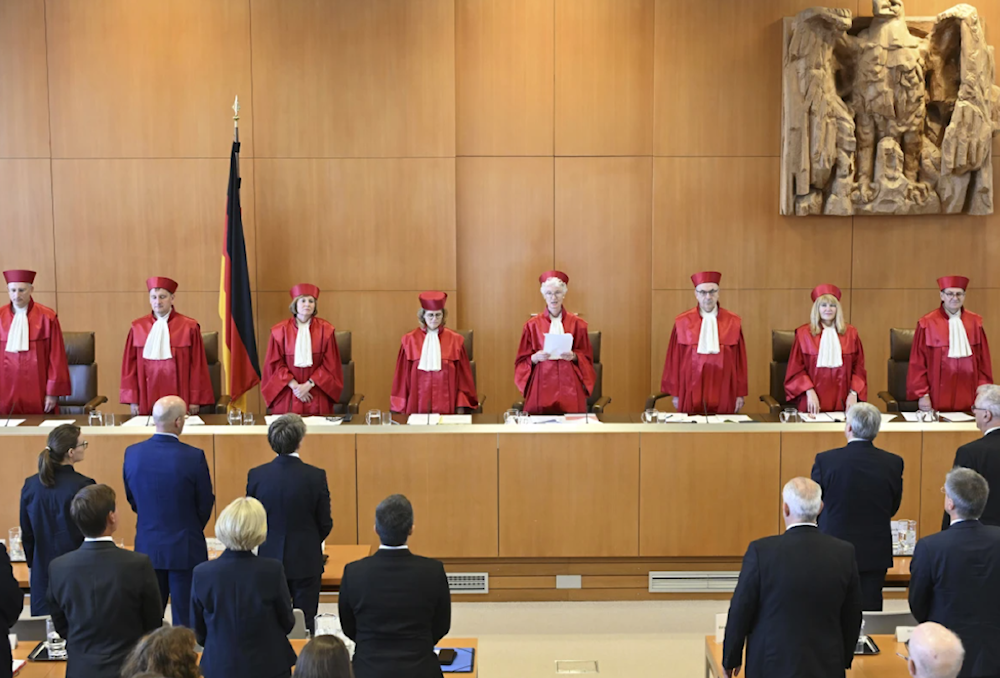Most Germans back snap election as coalition approval falls
The Bild daily surveyed 1,001 people from August 2 to 5, and found that 53% supported early elections, while 37% wanted the three-party coalition to finish its term. Another 10%per cent were uncertain.
-

The Second Senate of the Federal Constitutional Court announces the ruling on the electoral law reform of the traffic light coalition in Karlsruhe Germany on July 30, 2024. (AP)
According to an INSA survey released on Wednesday, over half of Germans wish to have a new federal election before fall of 2025 after the ruling left-green coalition's support rating fell to a historic low of 30%.
The Bild daily surveyed 1,001 people from August 2 to 5, and found that 53% supported early elections, while 37% wanted the three-party coalition to finish its term. Another 10%per cent were uncertain.
Most Greens( 74%) and center-left Social Democrats (78%)voted to keep the coalition in office until at least September 2025, while 43% of their Free Democratic Party minority allies supported a hasty election.
The coalition parties are grappling with declining support following poor results in the recent European Parliament elections, where the opposition conservative CDU-CSU bloc and the far-right AfD came first and second, respectively.
A major point of contention is unemployment benefits. Lindner advocates for restricting payouts, arguing they are too costly and do not provide enough of an incentive to get people to return to work. The SPD, however, opposes this idea, as improving benefits was a key campaign promise in 2021 aimed at regaining lower-income voter support.
"Politically, the Social Democrats cannot afford to give it up," Gougeon indicated.
Diplomacy and defense spending also divide the parties. Defense Minister Boris Pistorius of the SPD seeks increased funding for the military, exempting it from the debt brake.
German AfD lawmaker says attempt to ban is political, out of fear
In June, AfD member of parliament Eugene Schmidt told Sputnik that the attempt to outlaw the right-wing AfD party is an anti-democratic process that shows the fear of the German political elite, especially after its performance in the 2024 European Parliament elections.
German politician Marco Wanderwitz declared that he had persuaded a sufficient number of German parliamentarians to file a move to outlaw the AfD due to purported affiliations with far-right extremists.
If the Bundestag goes ahead with the proposal, the Federal Constitutional Court would have to decide whether to consider the AfD's potential ban.
Schmidt said, "It is unknown whether this plan will succeed, but the attempt to ban a democratically elected party, which enjoys enormous support in Germany, demonstrates the anti-democratic attitude of the establishment. At the same time, it shows its desperation: apparently they cannot find any other way to fight the AfD other than to ban it".
He added that Wanderwitz of the Christian Democratic Union (CDU) has garnered support from The Greens to oust the AfD.
With almost 14% of the vote, the incumbent Social Democratic Party of Germany, led by Chancellor Olaf Scholz, finished third in the most recent EU legislative elections. With 30% of the vote, the opposition CDU/CSU group won, with the AfD coming in second with 16%.
On June 12, the chairman of Germany's domestic intel agency announced that it would compile a fresh report on the AfD to investigate the party's extremist inclinations.
In recent years, the AfD has been entangled in a number of controversies, including a secret gathering of senior leaders to prepare mass deportation of immigrants, casting doubt on the party's adherence to democratic norms.
Since 2021, Germany's domestic intelligence service has been monitoring the AfD's youth wing and different affiliates.

 4 Min Read
4 Min Read








